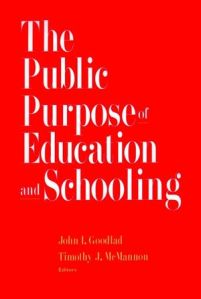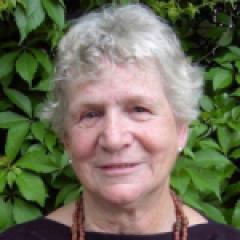Deborah Meier on Education: The Public Purpose of Education and Schooling
Dear readers,
I just finished a book published in 1997 edited by John Goodlad and Timothy McMannon. I could quote every page. But… Read it! Title: The Public Purpose of Education and Schooling, Jossey Bass Publishers. Especially Parts Two and Three which are a dialogue between some wonderful and thoughtful participants. (Part I consists of six essays by some of the distinguished crew.) Who? Benjamin Barber, Theodore Sizer, Linda Darling-Hammond, Gary Fenstermacher, Dona Kerr and Roger Soder. The second conversation included as well Don Ernst, Mary Ellen Finch, Susan Ropert and Mark OShea.
These conversations came right at that height of the onslaught of the “new reformers” which wiped out so much of the work described here by Goodlad and Sizer’s —NNER and CES. Their optimism about the work they were doing was hard for me to read—knowing as I did the future. Sobering. But my “half-full” brother’s advice reminds me that the NYC Consortium, for example, that is still growing has made Sizer’s work on graduation by exhibition, and the portfolio et al. respectable despite what has happened sicne. And the strength of the growing opposition to tests, the Common Core and maybe privatization as well, is something both men can take some credit for too. It is not always uphill, but the rate of change for the worse can be slowed and the onset of the next wave of reform—ours—can be encouraged.
One theme that comes up often in the conversations among the participants is: in what areas of life we are prepared to “waste” money and on which do we become rather puritanical. Some rich friends tell me that indeed they appreciate their ability to have the best of everything—including the arts and physical education—but that still these aren’t “essential” and require reducing in difficult fiscal times. “There’s just not enough money” for everything (except when we go to war, add money to the Pentagon’s budget above and beyond what they request, look for more adventures into the heavens above, et al.)
Donna Kerr’s suggestion of what might be the central question, “How is it we want ourselves to stand in relationship to one another,” struck home.
Linda Darling-Hammond states the tough truth: “Within the democratic society, schools may conduct themselves as the least democratic institutions… predominantly authoritarian institutions.” The question to ask is not, she says, so much building education “for democracy but schooling as democracy.”
Benjamin Barber reminds us of necessary differences between “family” discourse and public discourse, and the role of schools in keeping this distinction alive. He pushes hard and provokes some of the strongest parts of the discourse.
It has been almost 20 years since these discussions took place, but it is now on my must read list. Maybe it can be read aloud like a play in schools or public events!!! (Note though that—I think—all the participants except Linda Darling-Hammond are White.)
This blog post has been shared by permission from the author.
Readers wishing to comment on the content are encouraged to do so via the link to the original post.
Find the original post here:
The views expressed by the blogger are not necessarily those of NEPC.

